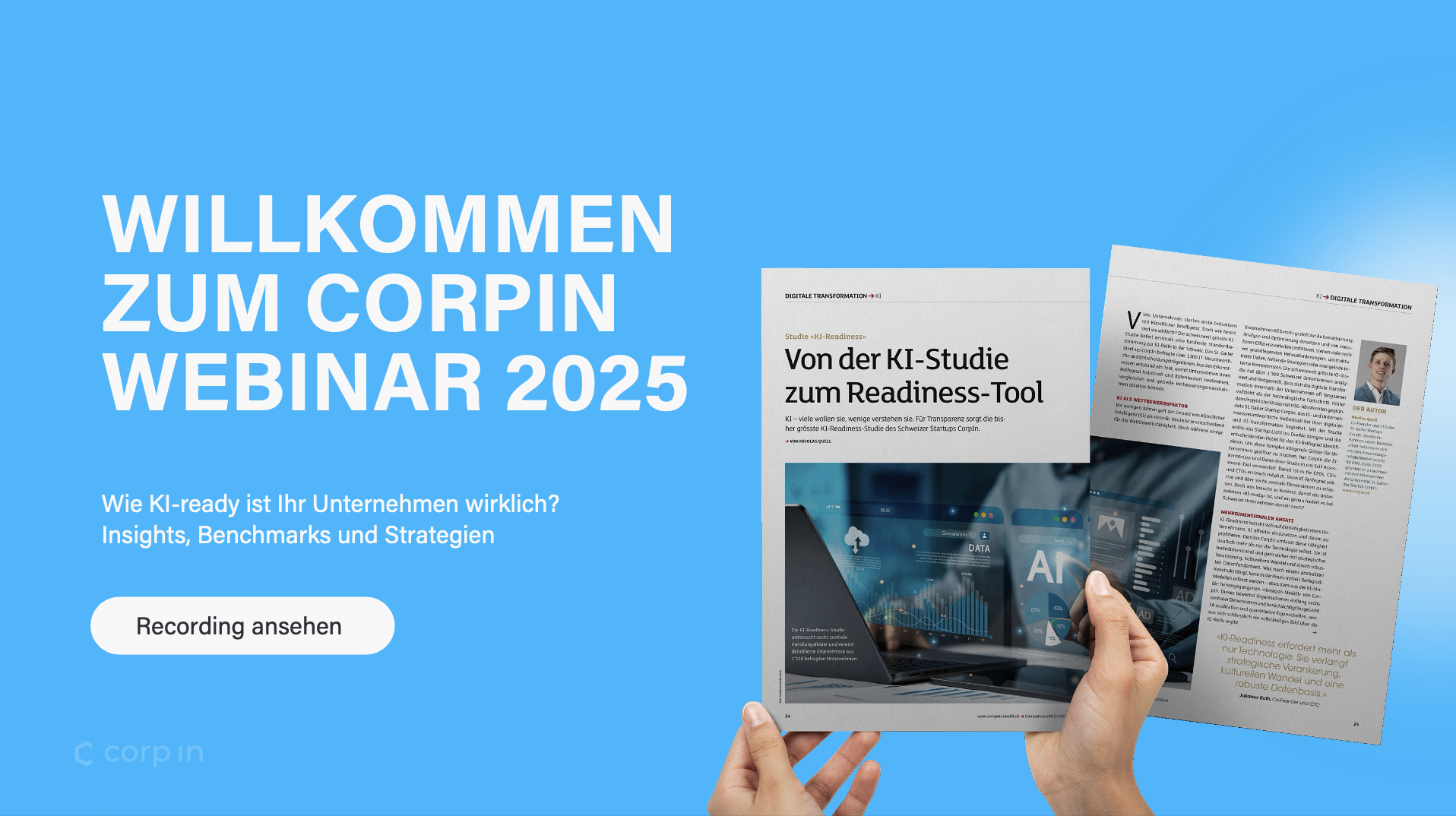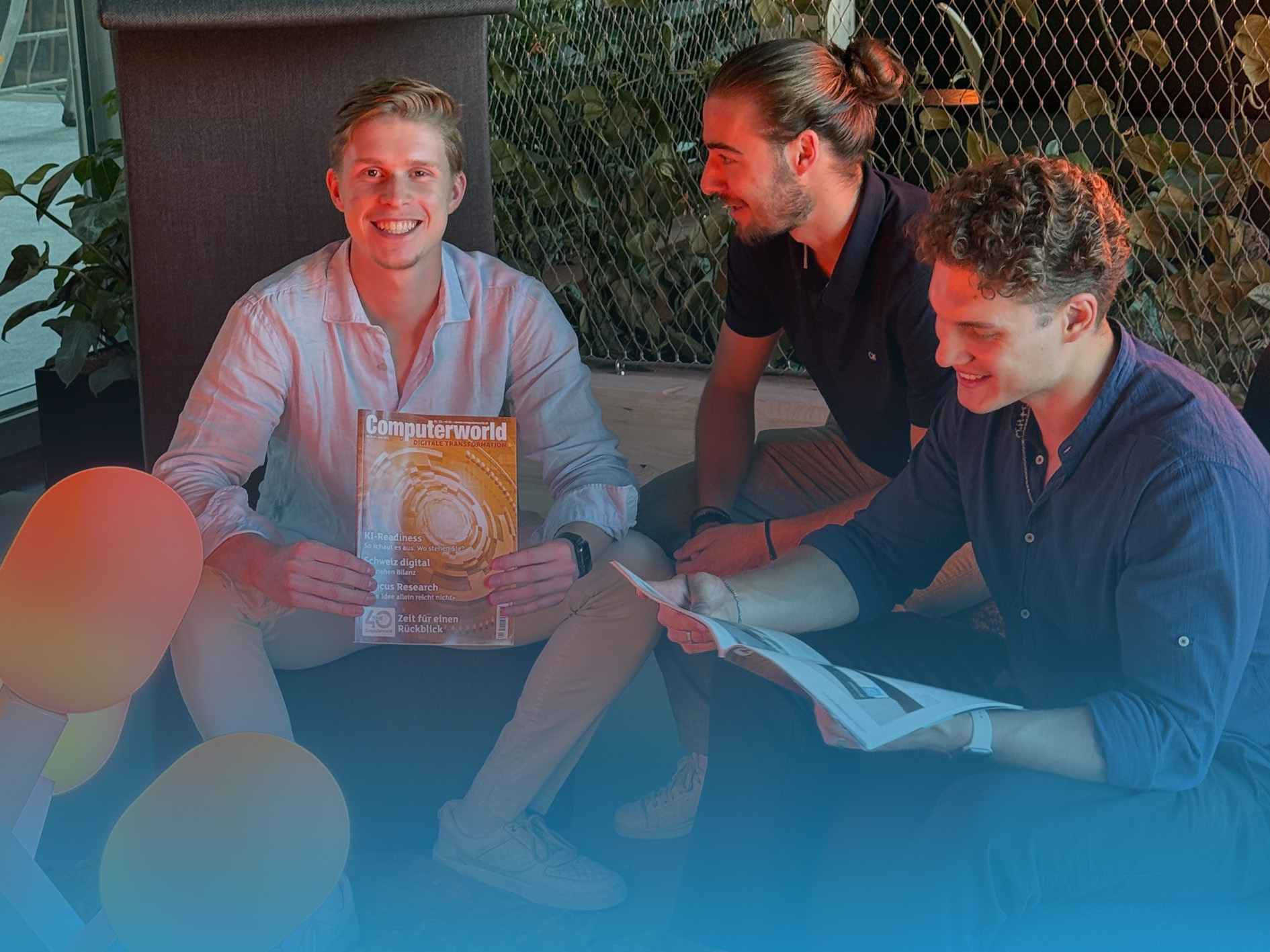AI trends 2025: these developments will shape Switzerland

Authored by

May 27, 2025
In 2025, artificial intelligence (AI) has finally evolved from a promise of the future to real value creation. AI adoption is also accelerating in Switzerland: more and more companies are integrating AI into products, processes and strategies. Decision-makers are faced with the task of keeping pace with global developments and adapting them to local conditions. Which AI trends will shape the Swiss corporate landscape in 2025? This article highlights the most relevant developments - based on the latest findings (including from the Swiss AI Report 2025) - and provides a strategic outlook on how companies can successfully exploit these trends.
AI as a strategic success factor in the company
By 2025, AI will no longer be an experimental field, but a strategic success factor. A recent study shows that 65% of Swiss companies have already anchored AI as part of their long-term corporate strategy - however, only 13% work with clearly defined, measurable goals for AI projects. This highlights an important trend: after the initial experimental phase of previous years, the professionalization of AI initiatives is now coming to the fore. Managers are integrating AI topics into their business strategy and creating internal structures (e.g. AI competence centers or AI leads) to manage AI projects in a targeted manner.
For Swiss companies, remaining competitive means using AI proactively. Companies that use AI successfully report efficiency gains, personalized customer experiences and new data-driven business models. At the same time, AI is becoming a must-have in many industries: Those who do not have an AI strategy now risk falling behind. The trend is not to view AI as an isolated tech project, but as an integral part of the corporate vision - comparable to digitalization a few years ago. It is important to establish performance measurement and KPIs for AI initiatives: Currently, over 50% of companies still refrain from measuring the impact of their AI applications, which makes it difficult for decision-makers to learn from pilot projects and invest on a large scale. A rethink is on the horizon in 2025: AI projects will be backed up with clear business objectives, key figures and ROI considerations so that they fit seamlessly into the corporate strategy.
Generative AI and multimodal models on the rise
Generative AI - especially large language models such as ChatGPT - has experienced an unprecedented boom in recent years. In 2025, we are seeing a consolidation of this trend in Switzerland: after the hype phase, generative AI tools are now being incorporated into specific business processes. Companies are using AI models to write texts, improve translations, generate code or create marketing content, which can significantly increase productivity. In addition, multimodal AI models are becoming increasingly important - i.e. AI systems that process text, images, audio or data in combination. Such models enable, for example, automatic evaluations of images and documents or complex analyses that take multiple data sources into account. For Swiss companies with an international customer base, multimodal and generative AI open up new opportunities to personalize customer experiences and drive innovation (for example in product development or customer service through intelligent chatbots).
The Swiss approach is interesting: instead of relying exclusively on big tech solutions, "Swiss versions" of AI models are being developed for specific requirements. Research institutions such as ETH Zurich and EPFL Lausanne are working together with industry and the federal government on domain-specific AI models - a kind of targeted Swiss ChatGPT for areas such as healthcare, financial services or manufacturing. These AI systems are more precise, more resource-efficient and tailored to multilingual Swiss data. The trend towards AI sovereignty is reflected here: Swiss companies want to benefit from AI without being completely dependent on international tech companies. Generative AI will therefore remain a key topic in 2025, but will be used more pragmatically - as a creative helper and driver of innovation within clearly defined use cases.
From chatbot to autonomous AI agent
As AI technology matures, the role of AI will evolve from a simple chatbot to an autonomous agent. In practice, this means that AI systems will take on more autonomous decisions and actions in 2025. What used to be simple rule-based chatbots for customer service are now intelligent assistants that can understand complex requests, plan action steps and even carry them out themselves. One example is AI-supported virtual assistants in the office that coordinate meetings independently, pre-formulate emails or prepare information from various data sources for decision-making.
At a societal level, this trend can be seen in the area of autonomous driving, among other things: From March 2025, autonomous vehicles will be allowed to drive on certain routes in Switzerland for the first time on a trial basis. This development - made possible by AI as the "brain" of the vehicles - signals that autonomous systems are increasingly becoming a reality. In the corporate context, we see AI agents in IT automation (autonomous monitoring of systems and rectification of simple problems) or in production (robots that react flexibly to changes), for example. For decision-makers, this means exploring the potential of agent-based AI now. Companies that gain experience with AI agents early on (for example in logistics optimization or as intelligent purchasing assistants) will gain an innovative edge. It is important to set clear guard rails - human supervision and control remain essential to ensure that autonomous AI always acts in the interests of the company and its customers.
Data infrastructure and AI integration as a basis
An often overlooked but crucial trend: no successful AI without a solid database. Swiss companies in 2025 are increasingly recognizing that data infrastructure and system integration are the cornerstones of their AI strategy. Only around 8% of companies still have a fully consistent, high-quality data structure - the essential basis for any AI application. Accordingly, more investment is being made in data warehousing, cleansed databases and interfaces. The aim is to break down data silos and provide AI algorithms with trustworthy, integrated data.
At the same time, the integration of AI solutions into existing business processes and IT systems is coming into focus. According to the Swiss AI Report 2025, the integrability aspect is the biggest obstacle to AI success: 64% of the companies surveyed cited the lack of integration of AI into their legacy systems and processes as a challenge. Although many companies are using initial AI prototypes, these often run in isolation and are not networked with core systems (ERP, CRM, supply chain software, etc.). In 2025, the trend will therefore be towards AI mainstreaming - AI must be brought out of the innovation labs and into operational reality. Cloud platforms and API-based architectures will facilitate this, as will new AI-as-a-service offerings.
Many companies use maturity models to assess the status quo of their AI capabilities. Tools such as the Hexagon platform from CorpIn make it possible to carry out a detailed assessment of your own AI readiness in just a few minutes. Six dimensions - from data management and technical infrastructure to corporate culture - reveal where strengths and gaps lie. Such assessments help decision-makers to identify priority areas for action: For example, expanding end-to-end IT integration (40% of companies are still lacking here) or improving data quality. The trend towards a sound AI foundation is clear: only those who have their data foundation and system landscape under control can implement AI solutions successfully and at scale.
Specialists, further training and AI culture
Technology alone is not enough - in 2025, much will therefore revolve around the human component of the AI transformation. A key trend is the focus on specialists and further training: there is still a shortage of AI expertise on the labor market, while demand is growing rapidly. According to the Swiss AI Report, 39% of Swiss companies complain about a lack of internal expertise. The answer to this is increased training and further education initiatives. Companies are investing in training to embed data skills and an understanding of AI in the workforce. However, so far only 9% of companies offer regular, mandatory AI training for employees - there is significant potential for expansion here in 2025.
At the same time, change management and AI culture are becoming increasingly important. New technologies reach their limits without the acceptance of the workforce: around 41% of companies observe skepticism or resistance from their employees towards AI. This is why progressive companies in 2025 are focusing on transparency, inclusion and cultural change. They clearly communicate the role that AI plays in everyday working life, allay fears (of job loss, for example) and emphasize the support function of AI. Some companies are establishing internal "AI ambassadors" or change management-driven workshops to promote a positive attitude. The focus is therefore shifting to people: augmentation rather than automation is the motto - AI should support employees, not replace them. Those who empower their teams and create an agile culture that is open to learning will be best able to exploit the benefits of the AI era.
Regulation and ethical AI as a framework
In 2025, ethical and regulatory developments will also play a formative role for AI in Switzerland. The EU AI Act is causing a stir on the international stage - the EU is creating strict rules for the use of AI, particularly in sensitive areas. Switzerland is now following suit: The federal government has announced that it will present a proposal for AI regulation before 2025, which is intended to minimize risks such as discrimination, lack of transparency or surveillance. These upcoming regulations will have an impact on companies: Compliance and responsible AI practices will become a must. Companies that use AI are paying more attention to the transparency of their algorithms, data protection and security. It is no coincidence that data protection and security concerns (50% of companies) are among the top challenges - a particularly important aspect in Switzerland with its strict data protection culture.
The trend is clearly moving in the direction of "Trusted AI": Only if customers, employees and partners have trust in AI systems can they develop their full benefits. Many companies will therefore implement ethics guidelines for AI in 2025, set up internal AI governance bodies or check their models for bias and fairness. Certifications and industry-wide codes (e.g. for the use of AI in medicine or the financial sector) are also gaining in importance. For Swiss companies, this focus on ethics also offers an opportunity: responsibly deployed AI can become a competitive differentiator, especially in international business. Companies that offer demonstrably sustainable, fair AI solutions strengthen their brand trust. Ultimately, clear framework conditions - whether statutory or self-imposed - create legal certainty and acceptance, which will only accelerate the further spread of AI.
Industry-specific AI innovations in Switzerland
The AI trends of 2025 are particularly evident in Switzerland in a number of key sectors. Thanks to a vibrant culture of innovation and a highly specialized economy, industry-specific AI solutions are emerging that are attracting global attention:
- Financial sector: Swiss banks and insurance companies use AI for automated analyses (e.g. in fraud detection or credit checks) and for personalized customer services. Robo-advisors and AI-supported financial assistants are becoming increasingly sophisticated, while back-office processes are becoming more efficient thanks to AI.
- Healthcare & pharma: AI helps to speed up medical diagnoses (e.g. through image analysis in radiology) and discover new drugs. Swiss pharmaceutical companies use machine learning to recognize patterns in large molecular data sets. At the same time, start-ups are emerging that use AI for personalized medicine or care - a trend that is being fuelled by the ageing population and the need for efficiency in the healthcare sector.
- Industry 4.0 & manufacturing: AI and IoT come together in the high-precision Swiss industry. Factories are implementing predictive maintenance with the help of AI to prevent breakdowns. Robots in production lines are becoming more flexible and adaptive thanks to AI, which enables the production of small batch sizes or customer-specific products.
- Retail & services: From retail (which uses AI for demand forecasting and merchandise management) to tourism (personalized recommendations for travelers through AI) - many service providers rely on AI to better predict customer trends and optimize processes. Chatbots take over initial consultations, and AI-supported translation helps Swiss companies to offer consistent services in several national languages.
- Public sector: Administrations and public services are also experimenting with AI - be it for traffic control, optimizing energy networks or for smart cities. The Swiss government is promoting AI research programs and pilot projects (e.g. in the area of mobility, see autonomous buses in individual cities) to make the public sector more efficient and improve the quality of life.
These industry-specific innovations show that AI is no longer an abstract concept, but provides tangible solutions to very specific problems. Industries that invest proactively and share know-how (for example in industry associations or innovation networks) benefit the most from the AI boost. As a high-tech location, Switzerland can make full use of its strengths here - well-trained talent, strong research and quality awareness.
Conclusion and strategic outlook
2025 marks a decisive turning point for AI in Switzerland: artificial intelligence is moving from hype to business normality. Companies that pick up on these trends will give themselves a clear head start. In concrete terms, this means strategically anchoring AI, doing their homework in terms of data, empowering employees and setting ethical guidelines. Swiss companies have the advantage of being able to draw on a robust innovation ecosystem - from leading universities to agile start-ups and specialized consultancies. The latter play an important role in imparting knowledge and developing practical strategies. St. Gallen-based CorpIn GmbH, for example, offers sound guidance with its Hexagon platform and the Swiss AI Report, which pave the way to AI excellence.
There is a clear mandate for decision-makers: act now, pilot and learn. The AI trends outlined in this article offer a wide range of opportunities - from efficiency gains to the development of new business models. Those who gather experience early on and scale up from small successes will be among the winners in the coming years. It is important not to shy away from thinking outside the box: Switzerland is positioning itself as a pioneer through the responsible, innovative use of AI - both nationally and internationally. CorpIn and other thought leaders in the industry are helping to actively shape this future. The message for 2025 is clear: AI is here to stay - and it is waiting to be fully exploited by visionary companies in Switzerland.
The content of this article may have been improved with the help of artificial intelligence. Therefore, we cannot guarantee that all information is complete and error-free.




